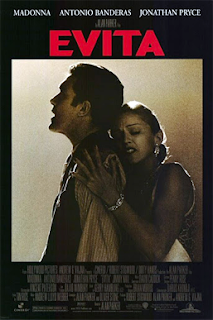Evita
Next up in the Alan Parker filmography is Evita, a lavish adaptation of the Broadway hit, covering the life of Eva Peron, the first lady of Argentina and a hero to the people who is revered there even today. It knocked around in development Hell for well over a decade--in fact, Parker had passed on it in 1980 after he made Fame, not wanting to make two musicals in a row. Fifteen years later he did make it.
The film is a grand spectacle. The sets, costumes, and photography by Darius Khondji are all first-rate. But I found it unmoving, and as with so many of Andrew Lloyd Webber's musicals, melodically tedious. It hits its high point when Madonna, in the title role, sings the signature number, "Don't Cry For Me, Argentina." Unfortunately, the film still has about an hour to go. I couldn't wait for it be over.
Eva Duarte Peron was born in a provincial town, the daughter of a man who had another, legitimate, family. At fifteen she latched onto a tango singer, who reluctantly took her to Buenos Aires, then dumped her. She slept her way to the top, becoming a model and then a film star, even though she couldn't act. She met Colonel Juan Peron, a man high up in government, and seduced him. He was elected president on a platform of workers' rights, and the film suggests that she was the one behind it.
As first lady she was immensely popular, and eventually aimed to be vice-president. But she had cancer, and died in 1952 at the age of 33. The film opens with a movie theater full of people told of her death, and their instant grief. She is given a grand funeral, attended by the masses.
That's an interesting story, but I'm not sure the film has anything to say about it. It is narrated by a Greek chorus, Antonio Banderas, who takes a cynical approach, calling the funeral a circus and not quite buying Evita's hype. There is a suggestion that during the Peron presidency there was corruption, so is the film saying that the empress had no clothes? I'm left wondering.
To this day this is Madonna's biggest film role, and I have to admit she's great. She didn't become famous because of her voice, but it's lovely here. A few of the numbers stand out, such as the one named, a rhumba-style one called "Buenos Aires," and "A New Argentina." Jonathan Pryce is fine as Peron, and Banderas has a surprisingly good singing voice.
I just couldn't see why this film was made, except that it was a big Broadway hit. Neither Parker nor his co-writer, Oliver Stone, seem to have any point of view. Did Eva Peron really care about the people, or was she a social climber with overweening ambition? I still don't know.



Comments
Post a Comment